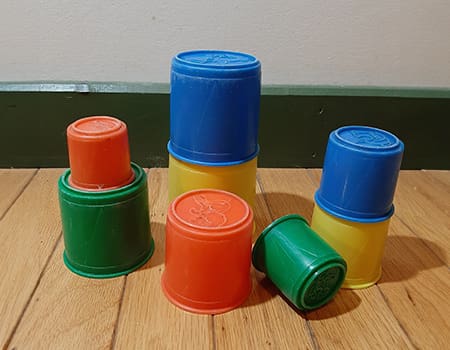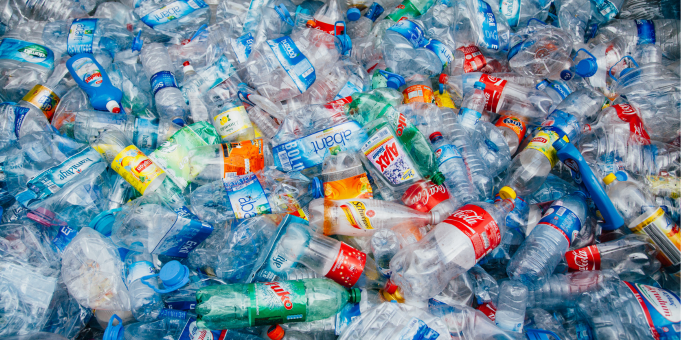Plastic can break down into smaller pieces, but it never goes away. With bold action, we can turn off the tap on plastic pollution today.
January 5, 2024. By Mara Shulman
Even though my children no longer play with toys, I’ve held onto a set of plastic stacking cups I played with as a child. The whimsical animal figures imprinted on the bottoms of the cups make me smile, reminding me of the world of imagination I once inhabited. Understandably, my teenage children have no interest in inheriting this adorable set – it has served its purpose in our family. But an even bigger issue concerns me. Whether I save it for my family, donate it, or put it in the bin, my precious plastic toy will never go away – and that’s not a good thing.
Is Plastic Biodegradable?
Regardless of how we dispose of it, plastic will not biodegrade. So, what does that mean? Most plastics can and will break down into smaller pieces. Even without human intervention, wind currents, sunlight, and other natural processes will slowly wear plastic down. This process can take hundreds or even thousands of years. But that doesn’t mean plastic reverts to nature – as a banana peel or a wooden toy does.
My stacking cups will eventually break into tiny plastic particles called microplastics. As plastic breaks down, it releases toxic chemicals and carcinogens into the environment.That’s terrifying.
Today, trillions of these tiny polluting particles – weighing over 2 million tons – float on the surface of the world’s oceans. But it doesn’t end there. Scientists have discovered that microplastics can break down even further. Due to their size, these nanoplastics can easily infiltrate our bodies through our skin, food, and even the air we breathe. The worst part? These plastic particles are not biodegradable either.
Single-Use Plastics: Forever Poisoning Our Lives
Plastic that lasts forever spells terrible news for people and the environment. In the U.S. alone, we produce about 40 million metric tons of plastic annually. And 85% of this plastic will end up as waste in a landfill.
So, while I worry about the impact of my plastic toy, what truly concerns me is single-use plastics. After all, I’ve only ever owned one set of stacking cups. Yet, most of us go through hundreds of single-use plastic items in our lifetime. The average person in the U.S. goes through about 156 plastic bottles and 365 disposable bags every year.
Single-use plastic packaging makes up about 40% of all plastic produced. This includes bottles, bags, and containers that, at best, will get used for a few hours before becoming trash.
When plastic gets thrown into a landfill, it goes out of sight, but the pollutants it releases persist. In theory, landfills encase waste in enclosed cells. But that’s far from the truth. Eventually, all landfills leak and leach toxic chemicals into our soil, air, and waterways.Because plastic is not biodegradable, it exacerbates this problem.
Incineration does not provide a better outcome. When burned, plastic spews pollutants into the air – causing irreparable harm to the health of our communities. And the remaining ash from incineration ends up in a landfill, too.
Our reliance on single-use plastic is poisoning us.
If Plastic Isn’t Biodegradable, Can’t We Recycle It?
Big Beverage companies like Coca-Cola, PepsiCo, and Nestlé have driven the global plastic pollution crisis for decades, thanks to the single-use bottles they use to sell their drinks. They have done everything they can to maintain the status quo.
Among its strategies to avoid responsibility, Big Beverage has invested millions of dollars to champion inadequate solutions like curbside recycling programs. Despite people’s best efforts, these programs have failed. In the U.S., barely 6 % of plastic waste gets recycled annually.
While pushing for curbside recycling feels noble, this tactic aims to put the burden and cost of plastic pollution on consumers instead of tackling the problem at its root. Big Beverage needs to stop trashing our communities. Yet, that doesn’t make recycling obsolete. We have solutions like bottle return programs that help us recycle plastic and other materials effectively.
Here’s the rub: While recycling can keep some litter out of landfills and incinerators, not everything can be recycled. Plus, the process of recycling bottles and other containers also creates microplastics. These particles expose workers to toxic chemicals and infiltrate our environment through wastewater used to sanitize plastics.
Recycling alone can’t save us from plastic pollution – we must invest in zero-waste solutions.
Time to Turn Off the Tap on Plastic
Plastic is not biodegradable, but that’s no reason to throw up our hands in defeat. We still have time to switch to more sustainable options, such as refillable containers and reusable packaging. Let’s reserve plastic for essential purposes – like medical equipment – and work to ditch single-use plastics for good.
CLF and our partners have pushed elected officials to pass laws to help us make this critical transition. From banning plastic bags in retail to passing bottle deposit bills, these solutions can help us move toward a cleaner future.
After all, if my children don’t care to inherit my cherished plastic stacking cups, I doubt future generations will care to inherit our plastic waste.

So, let’s take action to create the legacy our children and grandchildren deserve to inherit: a clean ocean, communities free from toxic pollution, and a healthy environment where they can achieve their full potential.
Strong zero-waste laws can help us turn this goal into a reality worth leaving to future generations. Join us. Contact your legislators and urge them to act against plastics today – we have zero time to waste.
Mara Shulman is a Senior Attorney for CLF’s Zero Waste Project. In this role, she works to advance CLF’s Zero Waste advocacy, litigation, and legislative work in Massachusetts, Connecticut, and Rhode Island. This post was first published in the Conservation Law Foundation website.


Recently on Twitter